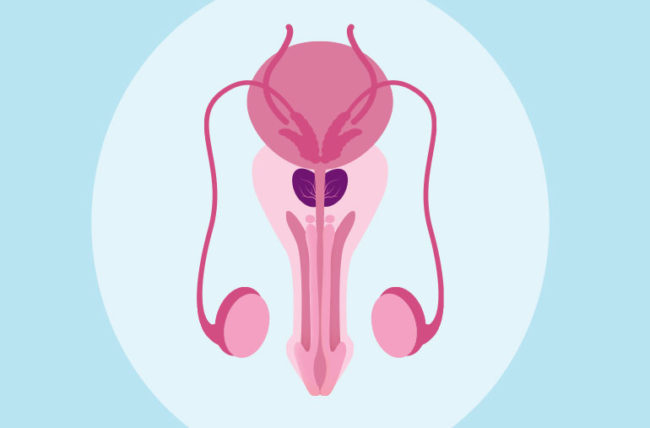The Human Prostate: What, Why, Where And More!
The human body works in miraculous ways. Different organs and glands work in tandem to ensure the smooth functioning of body processes. One such organ is the prostate gland. Usually only mentioned when things go wrong, the prostate gland is an integral part of the reproductive system for penis owners. This tiny organ not only contributes to the semen made by the body but also helps the smooth functioning of other organs around it. Interestingly, it is also the answer to the age-old amusing question of what keeps people from peeing and ejaculating simultaneously! |

Locating the prostate gland
Situated between the penis and bladder is a small gland, the size of which is roughly comparable to that of a walnut. This small, soft organ is the prostate gland and is found in several mammal species, including humans. It is most commonly found in humans with penises. It is even possible to feel this gland by wedging a finger into the rectum and moving it towards the anterior of the body. The prostate also has the urethra running through its centre. The urethra tube primarily carries urine and semen to be cast out of the body. Because the two organs (urethra and prostate) are so closely in contact, a blip in the functioning of the prostate gland can take a toll on the person’s urine flow. The prostate is the most widely known as a part of the reproductive anatomy for penis owners, among other features like the penis, scrotum and testes.

Why is it important?
The prostate gland might not be an essential organ for survival, but it is indispensable for fertility. As previously mentioned, one of its important functions includes helping to produce semen.
One of the components that make up semen is prostatic fluid. This fluid comes from the prostate, seminal vesicles and testicles. The prostate, on its own, is responsible for producing 20- 30% of this fluid in the semen. The prostatic fluid consists of elements like enzymes, zinc and citric acid, which make semen optimal for sperm cells. For instance, prostate-specific antigen (PSA) is one such enzyme that causes the semen to be thinner and more free-flowing. This fluidity helps the sperm advance more easily down the urethra and towards the egg. This fluid also helps balance the acidity of the vagina with its alkaline nature. During ejaculation, this prostatic fluid is pushed out of the prostate and into the urethra, where it mixes with sperm and fluid; to finally form semen.
Interestingly, when the prostate pushes the prostatic fluid, the bladder is sealed and kept from opening. This is why when the prostate is working, the bladder shuts, so it’s not possible to urinate and ejaculate at once.
The prostate gland also harbors important hormones like dihydrotestosterone (DHT) after converting it from testosterone by an enzyme. This hormone aids the development of secondary sex characteristics like facial hair explicitly.

What could go wrong? And how can we treat it?
A malfunctioning prostate can pose several problems. Many of these are to do with urination or control of the bladder. This can manifest into recurring bathroom visits, difficulty in urinating, a thin urine stream or sudden sporadic urges to urinate.
To understand better how the prostate can act up, let’s look at three common prostate conditions, their tests and treatments.
- Prostatitis: This occurs when the prostate gland swells up because of infections, injuries or immune system disorders. People suffering from this condition might experience difficulty while urinating, pain near the genitals, and even flu-like symptoms. Tests for assessing this condition usually include digital rectal exams and other urinary tests. Antibiotics prescribed by urologists, geriatricians and primary care providers can help alleviate the situation.
- Benign Prostatic Hyperplasia: This is also commonly called an enlarged prostate. It occurs when the prostate enlarges and pushes and pinches the urethra, reducing its width. This narrowed urethra tube and a slow down in emptying the bladder can cause the bladder to lose efficiency and the ability to drain itself. The enlargement of the gland is often attributed to age. This condition can further lead to bladder stones and weaker kidneys. People suffering from BPH may experience unsatisfactory bladder emptying, inadequate urination, or frequent urination. Treatment for BPH usually includes medication that will relax the prostate gland or minor surgeries. These are also prescribed and taken after consultations with urologists, geriatricians and primary care providers.
- Prostate Cancer: This is a common type of cancer in males and is treatable in the early stages. Like the other conditions, prostate cancer might be suspected if unusual urinating problems occur. Some even experience pain in the bones. Different types of prostate cancers grow at different rates and require different levels of monitoring and intervention. More intense forms might call for radiation, chemotherapy or hormone therapy by oncologists, radiation oncologists and urologists.
Conclusion
A major takeaway from reading about these conditions is that being inattentive and negligent of our bodies can have unfavorable consequences. Furthermore, one common point we can infer from the treatments of these conditions is that professional medical advice from urologists and other specialists would help gauge the seriousness of the situation best. Let’s be more cognizant of our bodies and its features, and stay safe!
Cover Illustration: Freepik
Author

